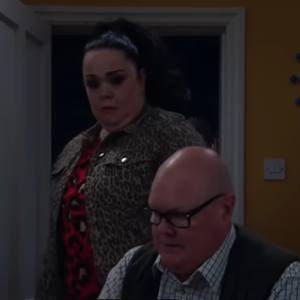In the gripping world of Emmerdale, Cain Dingle spirals into emotional chaos as the stunning revelation of Nate Robinson’s killer shakes the village to its core. What begins as a breakthrough in the murder investigation quickly morphs into a harrowing drama layered with deception, guilt, and heartbreak. The police announce a new suspect, Owen, a sinister figure infamous for drugging Robert Sugden, now accused of accidentally killing Nate during a violent clash. Owen’s subsequent discovery dead, with a chilling suicide note admitting guilt, should have offered Cain and Tracy a sliver of closure. Instead, it plunges them deeper into despair, leaving the relief they sought hollow and unattainable. The surface truth, however shocking, hides a darker, more twisted secret waiting to demolish everything Cain clings to. What intensifies this emotional maelstrom is the tragic irony that viewers understand long before the characters: the real killer is John Sugden, Nate’s biological father. Wracked by guilt, John orchestrates an elaborate deception, framing Owen to protect Cain from the brutal truth, believing this fabricated justice will bring him peace. But peace cannot be forged from lies. John’s flawed logic dooms Cain to torment, spiraling him closer to breaking point as the façade crumbles under the weight of unbearable grief.
Cain’s journey through this nightmare is a heartbreaking portrait of a man shattered by loss and unable to confront the true evil that took his son. His hardened exterior, built from years of hardship and loyalty to family, begins to crack under the strain of unrelenting grief and unanswered questions. Obsessed with finding answers, Cain fixates on Liam, the local GP who treated Owen, desperate for any clue that might unravel the tangled web of Nate’s death. Yet, every search only deepens his torment, as he wrestles with the absence of justice and the painful knowledge that the confrontation he so desperately needs is deliberately denied him. This emotional void becomes a form of trauma in itself, a gnawing wound exacerbated by the cruel reality that his suffering is based on a lie. The audience, privy to John’s guilt and the truth behind the scene, experiences a profound dramatic irony, watching a man spiral into anguish over a false narrative, while the actual killer suffers silently with his unbearable secret. This duality adds an intense emotional texture to the story, making Cain’s pain both poignant and avoidable, as it’s the truth—stifled and hidden—that holds the key to genuine healing.
Meanwhile, John Sugden’s tortured conscience threatens to crack under the immense pressure of his deception. The burden of framing Owen to shield Cain from the truth becomes an unbearable weight that isolates him further. In a desperate attempt to cope, John reaches out to an anonymous helpline, seeking solace and guidance. Encouraged by a volunteer to move their communication from text to voice, he teeters on the brink of confession. This small but significant step hints at a possible reckoning, a moment when the truth might finally surface. The dual struggles of Cain and John serve as a powerful exploration of grief’s complexities—the human urge to protect loved ones from pain, even when it means perpetuating a devastating lie. Through John’s silent battle and Cain’s shattered state, Emmerdale digs deep into the costly consequences of avoidance and denial, emphasizing that while the truth can be brutal, it is ultimately the only path to genuine closure. This storyline’s emotional depth and psychological nuance make it one of the soap’s most compelling and tragic arcs in recent memory. 
The ripple effects of this devastating secret stretch far beyond Cain and John, as the ripple of betrayal threatens to engulf the entire Dingle family. Tracy, caught in the whirlwind of blame and grief, suffers alongside Cain, their shared pain turning into mutual frustration and despair. The fragile bonds of family loyalty are tested to their limits, as everyone struggles to cope with the absence of Nate and the weight of the unknown. The community, too, becomes embroiled in the fallout, with tensions rising and suspicions simmering beneath the surface, awaiting an inevitable explosion. Emmerdale masterfully illustrates how trauma and secrets inject volatility into relationships, fracturing connections that once seemed unbreakable. Each character’s reaction builds toward a crescendo, where the fragile illusion John has constructed threatens to collapse spectacularly, ushering in new conflicts and revelations. The looming question remains: how long can this desperation-fueled deception last, and who will emerge unscathed when the truth finally bursts through the cracks?
As the storyline hurtles toward its climax, fans are left on edge, pondering the impossible choices facing Cain and John. Will John summon the courage to reveal the truth and face the consequences of his actions, ending the cycle of pain? Can Cain survive yet another heartbreak, or will this cruel twist push him beyond the point of recovery? The emotional tension Emmerdale generates is a testament to the soap’s skill at weaving intricate, human stories that resonate deeply with viewers. This narrative transcends typical soap opera melodrama, tackling themes of grief, guilt, and the desperate human need to rewrite reality to soften unbearable pain. At its core, this drama is a raw and unflinching look at the cost of lies, the devastation of loss, and the fragile hope for redemption. As the village braces for the impending fallout, one truth is clear: no secret stays hidden forever, and when it finally emerges, the scars it leaves will change lives forever.





